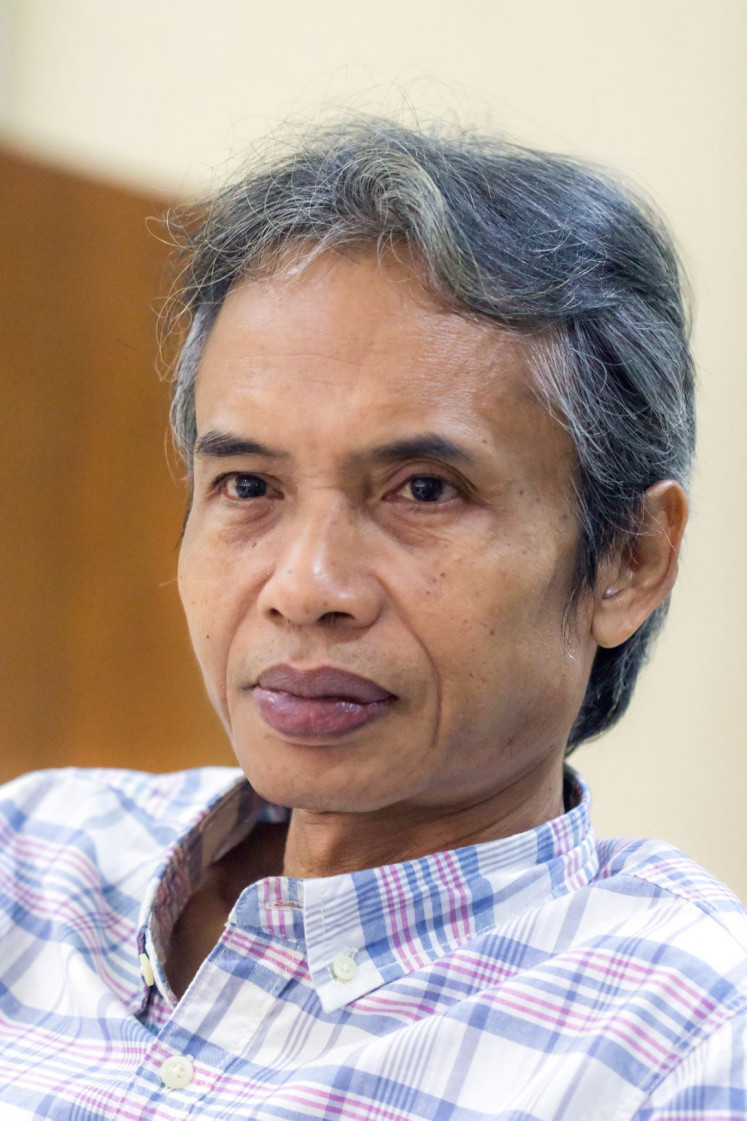Joko Pinurbo finds inspiration in the ordinary
The lines of a poem usually flow with grace, evoking ethereal feelings and stirring the imagination.
Change Size

For poet Joko Pinurbo, the worlds in his words are much more grounded, taking inspiration from the mundane and ordinary.
Even when he, like everyone else, shelters in place amid the pandemic, Jokpin as he is popularly known, somehow manages to turn a hospital scene into a poem that speaks to one’s conscience.
Di Rumah Sakit (At the hospital) is his latest work. It is a piece borne from a state of global anxiety, of silent prayers in sanitized corridors.
Perhaps the most striking part is the final stanza:
“KTP mengucapkan [The ID card wishes]
Selamat tidur kepada calon jenazah [A good night sleep to soon-to-be dead body]
Yang masih memikirkan [Who still thinks of]
Besok akan dikuburkan di mana [Where they will be buried tomorrow].”

In an Instagram Live session hosted by Bentara Budaya recently, he admitted that the stanza gave him the chills when he read it aloud for the first time after writing it.
“At that time, there were many instances of people rejecting burials, so I became inspired to write the poem. My point of view was that of the corpse, and I imagined many people suffering from COVID-19 being treated in hospitals were haunted by concerns that their bodies would also be rejected,” he said.
Born in Pelabuhan Ratu, West Java, on May 11, 1962, Joko has been a poet from a young age. He started writing poetry during high school at age 16, with his first poem published in his school’s magazine.
However, he still feels embarrassed about the poem, created some 42 years ago, even though he conceded that the poem already showcased his style and theme preference.
“It’s really a simple poem, but quite alright for a high schooler – maybe it’s nothing compared to us now.”
The poem’s title was simply Kamboja (Plumeria), which Joko observed was closely associated with cemeteries and death, with the chapel’s bells symbolizing a sense of sacredness.
“Kamboja itu berduka [The plumeria is grieving]
Mengiring kepergian daun-daun tua [For the loss of old leaves]
Yang gugur diterpa [Which fell by]
Lonceng gereja [The chapel’s bell].”
“There was a chapel in my dorm, and every day I heard the bells tolling. There was a plumeria tree beside the chapel and I pictured the bells ringing so loud that it moved the tree’s leaves,” Joko recalled.
He said he began by writing short poems before eventually writing longer ones.
From then on, he started sending out his poems to magazines, while also branching out to social themes, including pedicabs and childhood memories.
Still, Joko feels that a poet’s first poem is important, as it can give them an idea of the direction where their future work will go to.
His fixation with the ordinary in his poetry is attributed to his personal view: a poet can only excel in writing about things they internalize and are familiar with in their daily lives.
“For example, I cannot write about snow or deserts because I am not familiar with them – I don’t live in that kind of environment. What I write is really what I know and find to be a part of my life,” he said, adding that he thought a similar principle also applied to many other poets.
As for the scenes with everyday objects, Joko said he was simply curious as to why domestic objects and scenes were rarely explored by Indonesian poets before his time.
“It seems that objects like trousers, a sarong or a toilet are not considered poetic. I want to highlight these objects that are probably not poetic but very much a part of our lives and our bodies,” he said.
“The issue for a writer is in how these simple, trivial things can take us into musing about the absurdity of life. They might be simple, but behind their simplicity lies a struggle, a reflection about the essence of life.”
He provided an example in his poem Celana (Trousers), which he said was based on his musings on the Bible. The aim, he said, was so that the vocabulary, diction, and imagery of Indonesian poetry could become more varied.
Joko cited Chairil Anwar as one of his biggest role models, expressing amazement that a young figure like him could write poetry that still feels relevant to this day.
“Sapardi Djoko Damono’s works also greatly inspired me, and I even came to the realization that poetry could be written in a narrative way through his works after Duka-Mu Abadi [Your Grief is Eternal],” he said.
The author of many titles said his works were mostly inspired by what he read but his path toward being a poet was first and foremost because it was a hobby.
When asked about how he still managed to stay in the field despite the rejection and low pay early in his career, Joko ascribed it to the fact that poetry was a hobby he enjoyed greatly.
“I find happiness in writing poetry. I never relied on writing because of the low pay and sporadic nature. When it’s a hobby, you’ll stay in the field a long time,” he said.
“If I went into poetry to seek fame, maybe I wouldn’t have made it that long, but words have become my plaything – it’s my habitat.” (ste)









